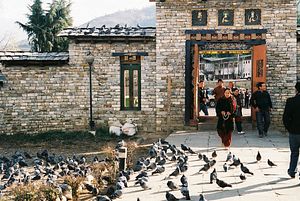Undeterred by a cloudy morning that threatened rain on election day in some areas, 234,535 Bhutanese voters exercised their right to vote across 866 polling stations as the country elected its third National Council, the upper house of Bhutan’s parliament.
Voter turnout saw a record participation of 54.3 percent of the total registered voter population of 432,030. That marked an increase of 9 percent from turnout in the previous elections in 2013, when 171,564 (45.15 percent) of the total 379,819 eligible voters participated.
Bhutan had seen a decreasing trend in voter participation between the first parliamentary elections in 2008 — when participation came in at 53.05 percent — and 2013.
The current, rebounded, participation rate suggests that key procedural reforms introduced by the Election Commission of Bhutan have succeeded in reigniting voter interest and halting the decline in voter participation.
Bhutan is a largely mountainous country where in some areas difficulties in accessibility and transport remain a major barrier to many voters. The election law mandates that individuals vote at their place of civic registration, which invariably assigns them to polling stations in their native villages. However, most Bhutanese citizens live in the capital and other major cities, which requires them to travel great distances to remote areas with difficult accessibility in order to cast their votes. In previous elections, this accessibility issue was a deterrent to vote. A study found that this problem affected large numbers of voters, keeping them from the ballot box. If left unaddressed in the long run, this problem could negatively influence the health of democracy in Bhutan.
Reforms Introduced
For the 2018 parliamentary elections, the Election Commission of Bhutan (ECB) sought to address these obstacles and ensure greater accessibility to voting. Key procedural reforms and innovations were introduced, including a new postal voting system. Under the new system, 64 postal voting stations provide postal voters, their spouses, and dependents with the ability to vote in person for their district of civil registration from their district of actual residence. The postal voting facility operated for two days and was also offered to Bhutanese residing farther abroad. The ECB also offered prisoners and persons with special needs the ability to cast their vote through mobile voting stations.
Official voter turnout figures released by the ECB confirmed the participation of 54.3 percent of eligible Bhutanese voters in the April 20 elections, suggesting that the procedural reforms introduced by the ECB succeeded in addressing the declining participation that marked previous elections. Of the total 234,535 voters, 169,623 (89,316 female and 80,307 male) cast their votes in person using electronic voting machines at the 866 polling stations; additionally, 64,912 voters (26,493 female, 38,419 male) opted to use postal ballot facilities. Of those, 42,441 voted through the 64 postal ballots facilitation booths and nine mobile facilitation booths on April 12, 13, and 14. About 22,471 used the conventional postal ballot facility.
Return of Elected Women
Another positive outcome of the election was the return of women representatives to the National Council. While there were four women in the first Council elected in 2008, no women were elected in 2013, although two women were among the five representatives appointed by the king. The 2018 elections saw six female candidates run alongside 121 men for the 20 elected seats. While all of the women performed well at the polls, two were winners, thus marking the return of elected women. The female candidate who won in Mongar district defeated 12 male contenders, while the female winner in Punakha district had to fend off the challenge of seven others, including another female contestant.
Despite Bhutanese women enjoying comparably stronger social standing than elsewhere in the region, gender parity in elections and democracy remains a challenge. In collaboration with the Bhutan Network for Empowering Women (BNEW) and the ECB, International IDEA has supported creating awareness of the importance and value of women participating in politics and running for public office. One of the concrete outcomes of such support is the Thimphu Declaration 2017, which emphasized the need to encourage women’s participation in the electoral process and further recommends affirmative legislative and policy support to enable that goal.
More effective policies to increase female representation, such as affirmative measures, need to be in place to reach more representative bodies in Bhutan’s ideal democracy. International IDEA will continue to partner with BNEW for the upcoming National Assembly elections scheduled to take place by the end of November 2018. International IDEA will work with BNEW to promote and advance the women’s representation by focusing on strengthening and developing leadership and communication skills of the women candidates to prepare them for the lower house elections.
This first phase for the election of the National Council members indicated that Bhutanese voters are interested in change, with only five out of the 12 incumbent candidates re-elected. While the chairperson of the National Council did not stand for re-election, the deputy chairperson — a two-term parliamentarian — lost his seat to a first-time contestant.
According to a Kuensel, Bhutan’s national newspaper, on April 21, “Bhutanese voters voted for a set of representatives at the prime age of their life. The average age of the 20 councillors-elect is 40. The oldest is 54 and the youngest 31. They come from a diverse background experience, which is essential for a law-making body. There are teachers, entrepreneurs, planners, lawyers, an actor, and a journalist.”
Karma Dema is the Bhutan Programme Management Coordinator at the International Institute for Democracy and Electoral Assistance (International IDEA).

































